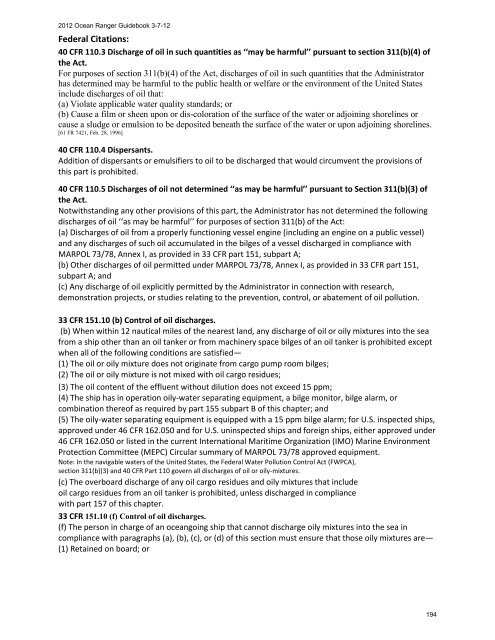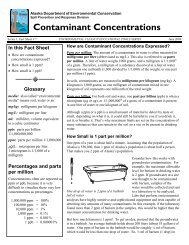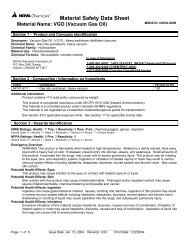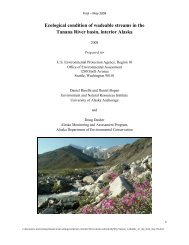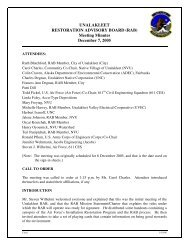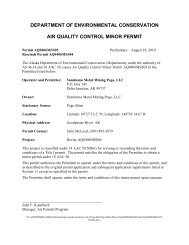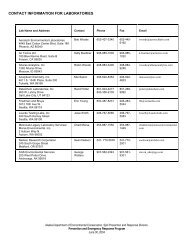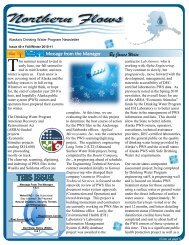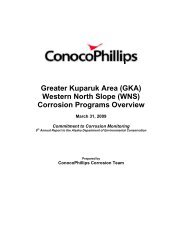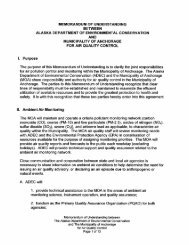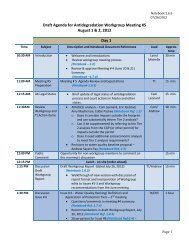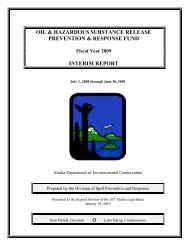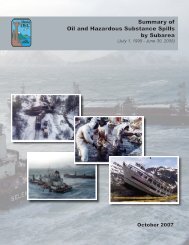2012 Ocean Ranger Guidebook Revision 3-7-12 - Alaska ...
2012 Ocean Ranger Guidebook Revision 3-7-12 - Alaska ...
2012 Ocean Ranger Guidebook Revision 3-7-12 - Alaska ...
Create successful ePaper yourself
Turn your PDF publications into a flip-book with our unique Google optimized e-Paper software.
<strong>20<strong>12</strong></strong> <strong>Ocean</strong> <strong>Ranger</strong> <strong>Guidebook</strong> 3-7-<strong>12</strong><br />
Federal Citations:<br />
40 CFR 110.3 Discharge of oil in such quantities as ‘‘may be harmful’’ pursuant to section 311(b)(4) of<br />
the Act.<br />
For purposes of section 311(b)(4) of the Act, discharges of oil in such quantities that the Administrator<br />
has determined may be harmful to the public health or welfare or the environment of the United States<br />
include discharges of oil that:<br />
(a) Violate applicable water quality standards; or<br />
(b) Cause a film or sheen upon or dis-coloration of the surface of the water or adjoining shorelines or<br />
cause a sludge or emulsion to be deposited beneath the surface of the water or upon adjoining shorelines.<br />
[61 FR 7421, Feb. 28, 1996]<br />
40 CFR 110.4 Dispersants.<br />
Addition of dispersants or emulsifiers to oil to be discharged that would circumvent the provisions of<br />
this part is prohibited.<br />
40 CFR 110.5 Discharges of oil not determined ‘‘as may be harmful’’ pursuant to Section 311(b)(3) of<br />
the Act.<br />
Notwithstanding any other provisions of this part, the Administrator has not determined the following<br />
discharges of oil ‘‘as may be harmful’’ for purposes of section 311(b) of the Act:<br />
(a) Discharges of oil from a properly functioning vessel engine (including an engine on a public vessel)<br />
and any discharges of such oil accumulated in the bilges of a vessel discharged in compliance with<br />
MARPOL 73/78, Annex I, as provided in 33 CFR part 151, subpart A;<br />
(b) Other discharges of oil permitted under MARPOL 73/78, Annex I, as provided in 33 CFR part 151,<br />
subpart A; and<br />
(c) Any discharge of oil explicitly permitted by the Administrator in connection with research,<br />
demonstration projects, or studies relating to the prevention, control, or abatement of oil pollution.<br />
33 CFR 151.10 (b) Control of oil discharges.<br />
(b) When within <strong>12</strong> nautical miles of the nearest land, any discharge of oil or oily mixtures into the sea<br />
from a ship other than an oil tanker or from machinery space bilges of an oil tanker is prohibited except<br />
when all of the following conditions are satisfied—<br />
(1) The oil or oily mixture does not originate from cargo pump room bilges;<br />
(2) The oil or oily mixture is not mixed with oil cargo residues;<br />
(3) The oil content of the effluent without dilution does not exceed 15 ppm;<br />
(4) The ship has in operation oily-water separating equipment, a bilge monitor, bilge alarm, or<br />
combination thereof as required by part 155 subpart B of this chapter; and<br />
(5) The oily-water separating equipment is equipped with a 15 ppm bilge alarm; for U.S. inspected ships,<br />
approved under 46 CFR 162.050 and for U.S. uninspected ships and foreign ships, either approved under<br />
46 CFR 162.050 or listed in the current International Maritime Organization (IMO) Marine Environment<br />
Protection Committee (MEPC) Circular summary of MARPOL 73/78 approved equipment.<br />
Note: In the navigable waters of the United States, the Federal Water Pollution Control Act (FWPCA),<br />
section 311(b)(3) and 40 CFR Part 110 govern all discharges of oil or oily-mixtures.<br />
(c) The overboard discharge of any oil cargo residues and oily mixtures that include<br />
oil cargo residues from an oil tanker is prohibited, unless discharged in compliance<br />
with part 157 of this chapter.<br />
33 CFR 151.10 (f) Control of oil discharges.<br />
(f) The person in charge of an oceangoing ship that cannot discharge oily mixtures into the sea in<br />
compliance with paragraphs (a), (b), (c), or (d) of this section must ensure that those oily mixtures are—<br />
(1) Retained on board; or<br />
194


